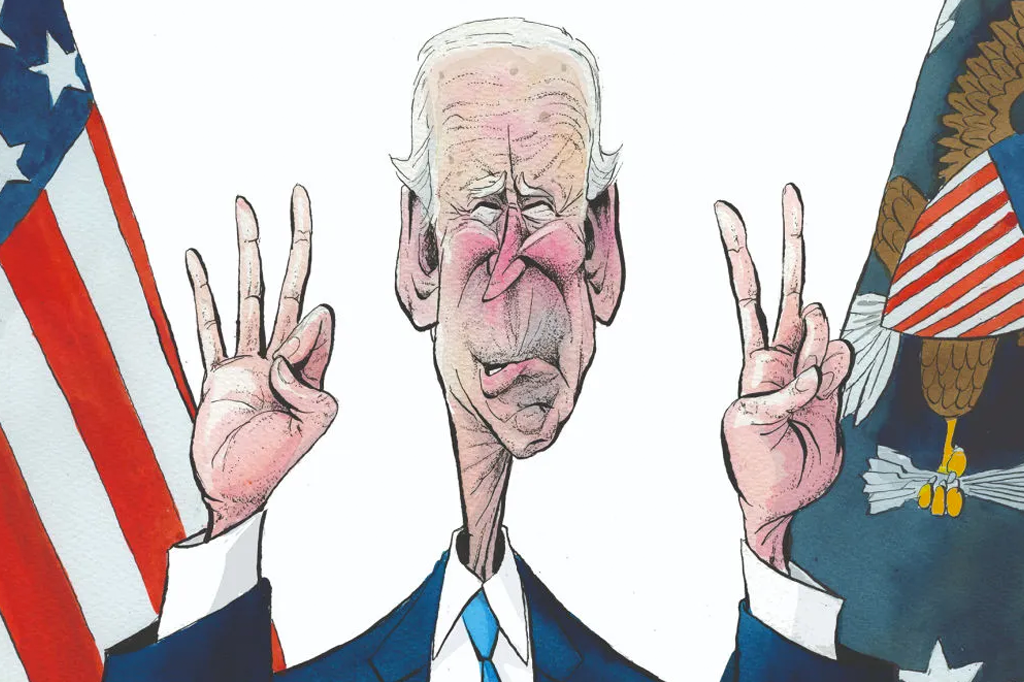The presidency of the United States is hard work, everybody knows that. It’s also a pretty sweet gig for should-be retirees. The eighty-year-old Joe Biden and First Lady Jill just spent six days holidaying on St. Croix in the Caribbean. Biden’s critics have been quick to point out that he has so far spent some 260 of his 715 days in office on vacation. That’s more than even the famously self-indulgent septuagenarian Donald Trump spent chillaxing at his estate in Florida.
Who knew that leading the free world could be a part-time job? And with so much downtime, plus such power and perks, why would any proud gerontocrat quit?
It’s been widely reported that Biden spent some of his time on St. Croix having “the conversation” with Jill and other loved ones — i.e. discussing whether or not he will run again in 2024. Even Biden’s allies admit that he’s not exactly young for his considerable age. He looks increasingly frail and his cognitive faculties often desert him. Can he really expect to carry out his duties up to January 2029, the end of his second term, when he’ll be eighty-six? At the risk of sounding morbid, will he even make it that far?
Six months ago, the on dit in Democratic circles was that Biden may well accept his orders from Father Time and stand aside. A lot has changed, however, and now the prevailing view among Washington insiders is that Biden expects to run next year. He also expects to win.
Bidenologists all make the same point: he spent five decades trying to be president, why would he stop now? “Failure at some point in your life is inevitable,” he once said. “But giving up is unforgivable.” How very American. Or as a more cynical Democratic operative puts it: “Who gives up Air Force One? The answer is nobody.”

Wife Jill, often said to be the real force behind the Resolute desk, has reportedly told confidants that she’s come round to the idea of another term. Having had doubts, she is now “fully supportive” of his ambition to go again. That could be spin, of course, and it’s worth remembering that the current wisdom of Washington is usually wrong or a lie. But the Bidens do appear to be enjoying life far more than they did six months ago, when inflation was still soaring and his “job approval rating” sank to 37 percent. Biden’s fortunes changed over the summer. The Supreme Court helped by overturning Roe v. Wade and hurling the abortion issue back on to the front lines of American politics. Trump did his bit by obnoxiously semi-announcing his candidacy for 2024.
Democratic pundits suddenly began talking about Biden’s “winning streak.” He passed some big spending bills, including a major student debt relief program. Meanwhile, Ukraine, backed by so many billions of Biden-approved military aid, won back some vital territory from the Russian enemy.
Then came November and the midterms. Biden’s party defied expectations, holding the Senate and only narrowly losing the House of Representatives. Suddenly the Biden doctrine of “defending democracy” — against Trump at home and Putin abroad — sounded less like pie-eyed liberal cant and more like a successful formula.
As the year closed, the inflation monster showed some signs of retreating — some twelve months after Biden said that it had hit its “peak,” yes, but enough to suggest that the Federal Reserve’s hopes for a “soft landing” rather than a hard recession may come true. Best of all, for Democrats, the Republican Party seems to be competing with Britain’s Tories in its appetite for self-destruction. On Tuesday, the party’s slim majority failed three times to install a House Speaker on the first day of Congress — something that last happened a century ago — as some right-wing Republicans refused to vote for Kevin McCarthy, the establishment choice. (By Friday they had failed thirteen times.) Even Donald Trump, no McCarthy fan, told the rebels they were “playing a dangerous game” — but the fractious radicals ignored him.
How much credit can President Biden take for all that? The joke in Washington is that the real Commander-in-Chief is the White House’s chief of staff Ron Klain, who is heavily involved in almost every move the administration makes. Biden, the grandpop frontman, can mumble his way through speeches about the threat of climate change and “the continued battle for the soul of our nation,” but at the level of what Republican conspiracy theorists like to call “the Deep State” the Democrats are waging some serious realpolitik. The war in Ukraine may be expensive for the US but it is no tragedy for its vast fossil fuel industry: liquefied natural gas and petroleum exports continued to grow in 2022. The sabotage of Russia’s Nord Stream pipelines — which most western analysts pinned on Putin — was a long-standing aim of many American foreign policy mavens. And with the Kremlin caught in a quagmire in eastern Europe, the US can focus on China, its true strategic rival.
Biden’s State Department, led by Secretary Antony Blinken, has continued the Obama- and Trump-era policies of shaping American foreign relations in order to hamper Beijing’s rise, albeit with a new emphasis on co-operating with China where possible. The key to this approach is an audacious bid to win the global cold war over computer chips: the Biden administration has committed some $200 billion to ramping up its chip-making capacities, and its Commerce Department has issued a broad ban on semi-conductor exports to China. This all seems very shrewd, at least until Xi Jinping invades Taiwan — the planet’s leader in chip manufacturing — and World War Three goes hot.
On that front, however, Biden’s dodderiness may come in handy. In his dealings with China and North Korea, Trump pursued the Nixonian “Mad Man” approach: by acting irrationally he kept adversaries guessing. Biden’s “Senile Man” style may prove even more effective. He has, for instance, repeatedly promised that America would defend Taiwan militarily in the event of a Chinese attack, only for the White House to roll back his remarks. In other words, the old US policy of “strategic ambiguity” towards the Taiwan Strait has become an even more confusing one of “possibly strategic amnesia.” Nobody knows if the man in charge knows what he’s saying — or even if he’s in charge. It’s brilliant and terrifying at the same time.
But Biden’s foreign policy record is not why he’s expected to fight on to 2024. It’s more that nobody can stop him. Kamala Harris, once thought to be his obvious successor, may prove to have been an ingeniously Machiavellian choice as vice president. She poses no threat to him whatsoever. Harris is one of the few public speakers in America who make Biden sound fully compos mentis. She consistently polls lower than him.

The New York Times and the Washington Post keep publishing insiderish lists of Democrats who might challenge Biden for his party’s nomination in 2024. These articles tend to read more like online clickbait than anything else. The Democratic bench is in fact hopelessly short on talent. California’s governor, Gavin Newsom, has often been touted, but he’s the opposite of well-liked and has said that he will not run. It’s possible that a lesser-known governor may emerge this year — J.B. Pritzker in Illinois, for instance, Jared Polis in Colorado, or Josh Shapiro in Pennsylvania. Yet if Biden elects to run, he should, with the advantages of incumbency and barring major scandal, catastrophe or bodily malfunction, brush potential rivals aside. Polls may suggest that a majority of Democratic voters want someone other than Biden as their party nominee in 2024. For now, however, they seem stuck with him. The Joe must go on.
The Biden presidency speaks to a deep dysfunctionality in American democracy. The administration may be chipper about the months ahead, but a large majority of voters do not share the feeling. There is a major immigration crisis on the southern border. Some 63 percent of Americans think their nation is on “the wrong track.” The US Treasury can point towards declining inflation numbers and robust employment statistics, but consumer confidence is at a near-decade low. Nearly 60 percent of Americans believe that the country is in recession.
Yet the Democrats, accepting perhaps that they have no other choice, have taken to deluding themselves that Bidenism is a big success. Before Christmas, Mike Donilon, a senior advisor at the White House, sent round a memo claiming that Biden had a “jolt of momentum” going into 2023. (The word “jolt” speaks volumes.)
“What hasn’t been reported on or fully understood,” said Donilon, “is how important a role the achievements and the agenda of the president and the Democrats played in the midterms.” Yet the midterms did not, in fact, suggest that Americans were impressed by Biden’s agenda. In the gubernatorial races in Ohio, Florida and Georgia — three states that could help swing the next presidential election — the Republicans won with ease. The truth is, if you discount the failure of various high-profile gonzo Trumpist candidates and the popular reaction to the Republicans’ big legal victory over abortion, there was a “red wave” against Biden in November.
Which leads us to the other reason Biden may still be plodding around the West Wing in his slippers in a few years: Americans are sick of Trump. Republican experts such as Karl Rove desperately want to move on from the Trump era and polls suggest conservative voters are abandoning Trump for Florida governor Ron De Santis in droves. Yet Trump still has a movement behind him and commands significant levels of support across the country.
Senior Democrats will never say so out loud, but their secret hope is for a bitter, very right-wing contest for the Republican nomination, one which Trump either wins or narrowly loses. In the latter scenario, Trump would presumably sulk and refuse to endorse the Republican nominee. He may even try a third-party bid, which would split the right and hand Biden a second term.
That’s why, for all their talk of putting Trump behind bars for abetting the so-called “insurrection” on January 6, 2020, or illegally hoarding away state documents at Mar-a-Lago, the Democrats have Trump where they want him: mired in legal problems, yet still the loudest voice in Republican politics.
In his inaugural address, President Biden promised to “unite the country” after the horror of Trump. “Democracy is precious,” he said. To win again, however, the old boy needs to keep America nicely divided.
This article was originally published in The Spectator’s UK magazine. Subscribe to the World edition here.

























